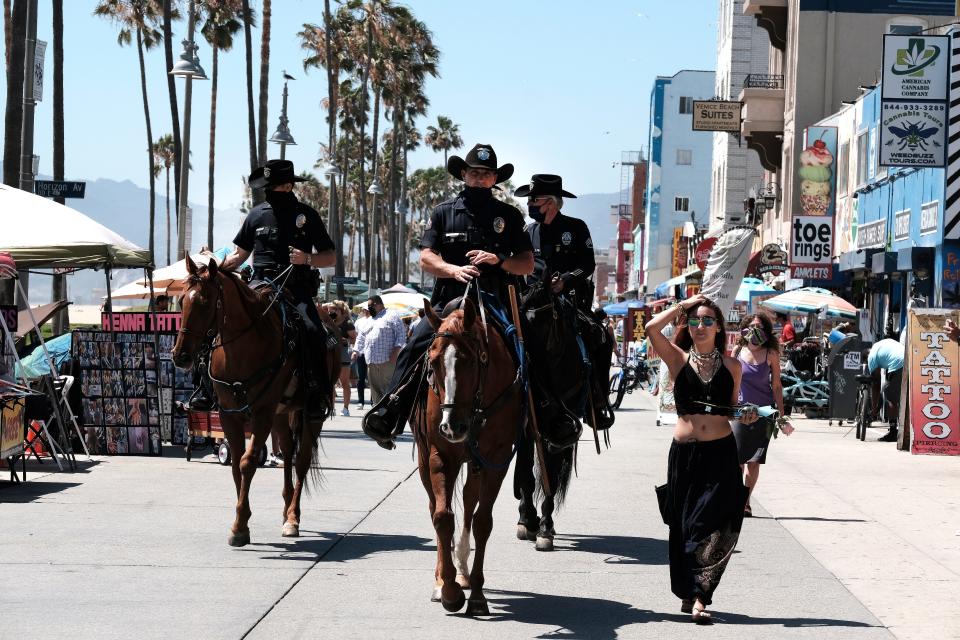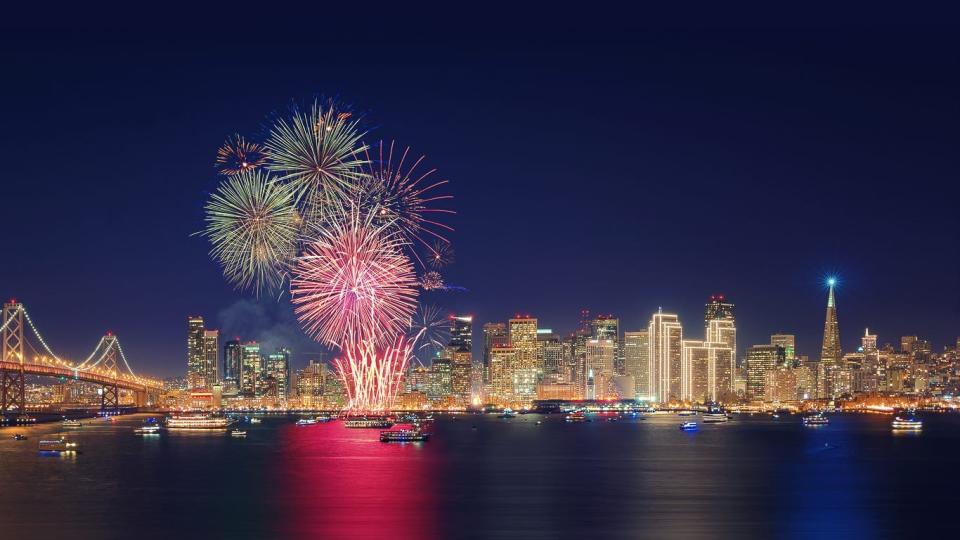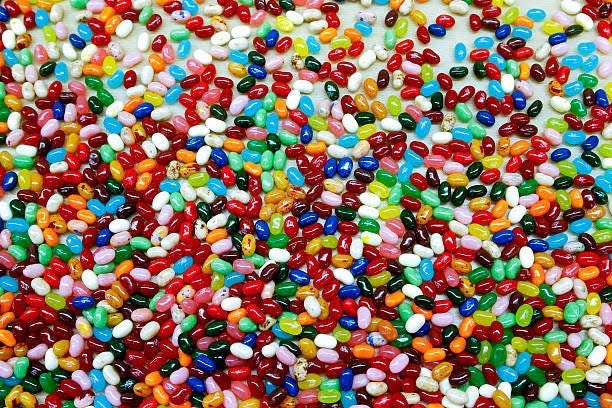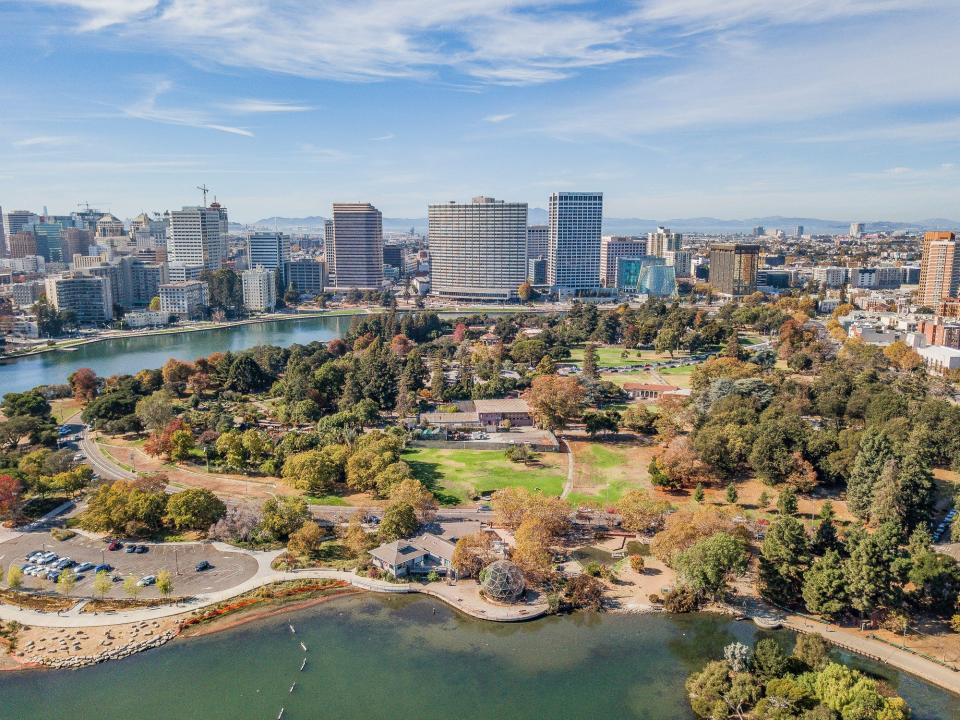In CA: You weren’t imagining it: There really WERE more fireworks this year
It was a busy weekend for emergency responders as people took the Fourth of July into their own hands. And: Less than 1% of businesses visited get cited for failing to follow the state's coronavirus operating guidelines. Plus: Gentrification is widespread across the state, a new report finds.
It's Arlene Martínez, and let me be the first to welcome you to a new week.
But first, finding change for that dollar (or, for your business) may prove difficult because of a coronavirus-induced coin shortage. Of all the things to think about ...
In California brings you top stories and commentary from across the USA TODAY Network and beyond. Get it free, straight to your inbox.
483,000 ‘contacts,’ nearly 6,000 visits, 52 citations

The state's new "strike teams," announced last week by Gov. Gavin Newsom as a method to try to reduce rising numbers of coronavirus cases, contacted hundreds of thousands of businesses over the long weekend — most by mail.
Strike teams also visited nearly 6,000 in-person visits to bars and restaurants and provided 344 beauty and barbershops with safety checklists, officials said.
In the end, the 10 agencies issued 52 citations.
Newsom said that's because most people and businesses complied with state orders on face coverings and followed operating closure restrictions. "Even if people were out of compliance, the engagement got people back into compliance very quickly," he said on Monday.
Newsom formed the teams after some local officials openly said they would not enforce new shutdown orders or the statewide mask rule.
As of Monday, there were 23 counties on the state's watch list, up from 19 on Thursday. Counties put on the list have disturbing coronavirus trendlines when it comes to hospitalizations and caseloads, and as a result, must shut down parts of their economies.
The Capitol was closed Monday after Assemblywoman Autumn Burke and four others tested positive for the coronavirus, which likely spread during meetings to pass the state budget in late June.
A rally to recall Newsom drew around 20 people in Palm Desert on Sunday night. “It’s a pro-America rally,” said co-organizer Toni Ringlein, who said she lost multiple jobs due to the state’s pandemic shut down. “We are protesting (Newsom’s) overreach.”
Let’s talk the Fourth on the sixth

So, did you hear any fireworks on Saturday? Just kidding. Of course you did, and you weren't imagining it was probably way more frequent than usual, leading one coastal police department to tweet: "It quite possibly could have been the busiest night ever."
How bad was it? Well, San Francisco reported 100 fires between 3 p.m. and 11:30 p.m. on Saturday.
And Los Angeles County saw an explosion of air pollution and emergency calls for service.
Which California businesses got PPP money?

After at first declining to say which businesses received public money to help keep workers employed during the pandemic, the Trump administration on Monday released data on 660,000 businesses that took advantage of the program.
The data show more than 580,000 Golden State businesses received more than $68 billion in the last three months as part of the Paycheck Protection Program. PPP was designed to help businesses with 500 or fewer employees keep their doors open.
Though initially a loan, it could be forgiven altogether if a company met certain benchmarks (like keeping employees paid for at least eight weeks after receiving the loan).
The L.A. Times has more information on which businesses got how much and which ones received then returned the money (Los Angeles Lakers, Shake Shack, Potbelly).
Nationally, the list includes lawmaker-connected businesses like car dealerships, casinos, construction companies and restaurants.
As of July 1, PPP still had $130 billion to distribute; business owners have until Aug. 8 to apply.
What else we’re talking about
Led by students, Justice in the Classroom seeks to push for a curriculum that moves away from European-dominated writings and influence, calls for greater diversity in hiring and seeks to track racial and ethnic data when it comes to student discipline and consequences.
Ventura-based Patagonia is among the companies boycotting Facebook as part of a #StopHateForProfit campaign aimed at holding the social media giant responsible for how it allegedly enables and benefits from racism and misinformation.
The LAPD responds to a million 911 calls per year but just 8% are for violent crimes, an LA Times analysis found.
Inmate firefighters comprise 43% of the state's wildfire firefighting force but not so this year, following a coronavirus outbreak at its training center.
Gentrified California

A new report shows the Golden State was home to five of the 20 most gentrified cities in the country, with the San Francisco-Oakland metro area claiming the top spot.
Gentrification in this report refers to the displacement of existing, low-income populations, which the National Community Reinvestment Coalition tracked by measuring changes in income, home values and education levels during a five-year period ending in 2017.
The other California cities on the list were San Jose (8), Sacramento (10), San Diego (14) and Los Angeles (15).
The report also dove into the impact of Opportunity Zones, created as part of the 2017 “Tax Cuts and Jobs Act,” which offer significant tax benefits to property owners who invest in them.
The report's authors suggest policies should be implemented so the zones don't accelerate gentrification without adding jobs and affordable housing and spurring economic development.
The report also questioned the choice of some zones. A Menlo Park neighborhood less than 2 miles from Stanford’s campus was named an Opportunity Zone, despite home prices that are 10 times the national average.
Among the investors getting in on the OZ action are President Trump's daughter and son-in-law.
That's it for today. Enjoy the quiet (if everyone used their fireworks up, that is).
In California brings you top news and analysis from across USA TODAY Network newsrooms. Also contributing: Fast Company, Sacramento Bee, Los Angeles Times, San Francisco Chronicle, Associated Press.
This article originally appeared on USA TODAY: Fireworks, California, citations, gentrification, PPP: Monday news

